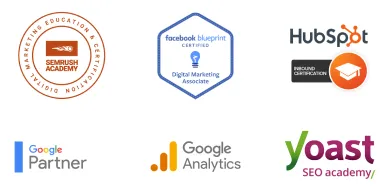TO LEARN IS TO GROW
Learning Center
We do our research and publish our results. Should probably call this the Growing Center.


Inbound Digital Marketing: Why Is It More Important in the New Normal?
The COVID-19 pandemic has created 2021 digital marketing trends never seen before, prompting some sectors that were initially resistant to go online to adapt to the new norm.
The Internet has paved the way for a more interactive, consumer-driven media platform that gave birth to a new marketing approach. Because people now have the tools to block unsolicited and intrusive information, promoting a product or service to a general audience and expecting that some of them would convert into actual customers is not just expensive but also detrimental to the long-term success of marketing.
Inbound digital marketing is an inevitable byproduct of the Internet. And as the world is gradually recovering from the COVID-19 pandemic, it becomes even more important due to the new normal that comes with new consumer sentiment and behavior.
The global pandemic has not only created new consumer behavior and sentiment. Due to months of lockdown and shut down in 2020, it also forced sectors initially resistant to go online–such as the small players in the grocery and supermarket industry–to use the Internet.
Meanwhile, companies in the most affected industries that were not quick to adapt to the new norm closed their doors for good.
According to a recent report released by the S&P Global, the most affected industries by COVID-19 are (in respective order) airlines, leisure facilities, oil and gas, auto parts and equipment, and restaurants.
Small Businesses Need to Go Online
Despite the widespread popularity of online shopping even before the global pandemic, around 90% of US commerce took place in the physical world. And for small businesses, including restaurants, gym studios, bakeries, and bookstores, brick-and-mortar operations were their main attraction as people needed a venue where they could interact with others while spending their money.
But the brick-and-mortar companies that were not quick to adapt to the new business landscape were the first casualties of the pandemic. In fact, about one in five small businesses were forced to shut down temporarily since the start of the pandemic, according to a report released by the US Chamber of Commerce.
In response to stay-at-home protocols, small businesses initially resistant to go online were forced to list their physical goods on Amazon and other online retailers, while some even created their own e-commerce sites and Facebook page to reach their customers.
Meanwhile, small food businesses such as restaurants and grocers partnered with grocery delivery and pick-up service providers like Instacart to stay afloat.
Experts believe that the effects of COVID-19 will ripple for many years, even after the pandemic has been well under control.

Going Online Is Not Enough
Shifting online is not enough to remain competitive and “relevant” amidst this new normal. Because almost all businesses have some type of online presence, it becomes even more difficult to stand out from the crowd and attract people’s attention in a sea of “white noise.”
Furthermore, today’s consumers have less budget for discretionary expenses like restaurant meals and entertainment sources (e.g., video subscription, casino, and music).
Another grim finding: It could take up to five years for the physical stores to bounce back from the repercussions of the global pandemic. To stay afloat in this new normal, they should shift online and ensure that they provide a great “experience” for their customers.
Just like in offline or brick-and-mortar operations, a great online experience also focuses on speedy service (i.e., fast-loading sites and responsive buttons), easy-to-understand product listing (web design leaning toward minimalism), and good customer service (e.g., return policy).
To remain competitive, leading digital marketing expert LOJO Marketing highlights the importance of adopting inbound marketing, which should contain these key elements:
Customer-focused ads
Mobile-friendly site
High-quality content
Customer-focused ads
All customer-focused ads only target the “right” consumers based on their online activities (likes and searches), location, and demographics. To further ensure that they are receptive to the message, businesses should also consider the buyer’s journey.
In a nutshell, the buyer’s journey is the buying process that people go through to become aware of the product or service (awareness stage), evaluate their options (consideration stage), and ultimately, purchase the product (decision stage).
Mobile-friendly site
As of January 2021 (Statistica report), around 4.66 billion people were active Internet users, with 92.6% of them using mobile devices. This makes mobile-friendly sites a necessity rather than an option for businesses that want to remain competitive in this new norm.
Mobile-friendly sites have key elements that include responsive pages, fast-loading sites (under 2 seconds), absence of intrusive ads and pop-ups, relatively large buttons, “convenient” font sizes, minimalist web design, and lack of flash.

High-quality content
Instead of churning out blatant advertising messages, businesses will find more success if they create content that helps and informs their target audience. How-to blogs, video tutorials, infographics, podcasts, and ebooks are just some of the most effective “subtle” marketing tools.
With this free but valuable content, businesses can drive traffic and position themselves as reputable and trustworthy sources. After all, people only buy from someone they trust.
Digital Marketing and Analytics
Unlike traditional marketing like TV and radio ads that are difficult or even impossible to analyze, digital marketing allows businesses to conduct in-depth research and analysis.
With Internet marketing, businesses can determine the number of views and visitors to their website, measure the traffic and popular trends, study the demographics of their customers and site visitors, and gauge the success of their advertising campaigns.
This valuable data can help companies write content that answers their customers’ pain points, tweak their paid ads in a way that they “reflect” the language of their audience based on their searches and keywords and phrases, and create social media posts that can “humanize” their interactions with their clients.
Thanks to the interactive nature of digital marketing (i.e., two-way communication), customers can also share their thoughts and ideas, which the companies should listen to in order to show that they value their audience’s feedback.
Through customer feedback, businesses can improve their product and service, create valuable content that “speaks” the audience’s language (this is where the use of relevant keywords and phrases comes into play), and identify the online platforms where they hang out.
Conclusion
Due to last year’s disruptive event, several iconic stores and entertainment companies closed their doors for good. Of course, small businesses also felt the impact not just from the social distancing protocols and shutdowns, but also from the reduced discretionary spending, especially in brick-and-mortar stores.
Even as the economy is slowly recovering, brick-and-mortar operations are still limited due to social distancing measures and store capacity restrictions. Thus, the use of online platforms remains critical for the long-term success or even survival of businesses.
At LOJO Marketing, we closely monitor the ever-changing business landscape and consumer behavior. To learn more about inbound digital marketing and how it is adapting to the new normal, contact us at (916) 303-4080 and schedule a free consultation.
Growing Businesses Since 2008
We have helped hundreds of businesses just like yours. Working for or along-side of business owner, managers, staff, or even board of directors, LOJO is ready to be an asset to your business.
Our team has been curated through the years for individual skills, personalities, and capabilities. Our clients put their trust in us to help them grow. We are here to do just that.



Growing Businesses Since 2008
We have helped hundreds of businesses just like yours. Working for or along-side of business owner, managers, staff, or even board of directors, LOJO is ready to be an asset to your business.
Our team has been curated through the years for individual skills, personalities, and capabilities. Our clients put their trust in us to help them grow. We are here to do just that.




Matthew Rogers, President
iProspect Check
After spending several months reviewing multiple proposals from several different companies we engaged LOJO to develop a new website that represents our company effectively. We worked initially with Stephen Platte who helped create the scope of the project. Stephen was knowledgeable and always followed up with me on time and as promised.
He "closed the deal" for LOJO with his professionalism, service orientation and easy going approach. Once we signed the contract we were introduced to Jay Kelly who would be the creative lead for LOJO. This was the most challenging part of the project for my company, as there was no shortage of ideas from our side. Jay managed the project flawlessly, and once we had all agreed to the design, Jay introduced us to Eric.
Eric Lay is one of the founders of LOJO. Eric took the design we had developed and brought it to life. We delivered content as quickly as he requested it. Eric kept the project on task and we responded by exceeding every deadline for content. In turn, once provided, literally not a day went by that Eric didn't add the content and take the next step. In just a few weeks we launched our new website. Eric is a pleasure to work with.
His positive attitude and consultative approach really enhanced the experience and made a big difference for us in the outcome of our project. We would welcome you to visit our website to take a look at the quality work of LOJO. We are very pleased with LOJO and look forward to working with them in the future as we pursue an aggressive SEO strategy."
After spending several months reviewing multiple proposals from several different companies we engaged LOJO to develop a new website that represents our company effectively. We worked initially with Stephen Platte who helped create the scope of the project. Stephen was knowledgeable and always followed up with me on time and as promised.
He "closed the deal" for LOJO with his professionalism, service orientation and easy going approach. Once we signed the contract we were introduced to Jay Kelly who would be the creative lead for LOJO. This was the most challenging part of the project for my company, as there was no shortage of ideas from our side. Jay managed the project flawlessly, and once we had all agreed to the design, Jay introduced us to Eric.
Eric Lay is one of the founders of LOJO. Eric took the design we had developed and brought it to life. We delivered content as quickly as he requested it. Eric kept the project on task and we responded by exceeding every deadline for content. In turn, once provided, literally not a day went by that Eric didn't add the content and take the next step. In just a few weeks we launched our new website. Eric is a pleasure to work with.
His positive attitude and consultative approach really enhanced the experience and made a big difference for us in the outcome of our project. We would welcome you to visit our website to take a look at the quality work of LOJO. We are very pleased with LOJO and look forward to working with them in the future as we pursue an aggressive SEO strategy."

Matthew Rogers, President
iProspect Check
The team at LOJO were wonderful to work with. They are well organized and very patient as we worked through our marketing strategy and developed a well thought out and clear action plan at a reasonable price. We will definitely be back for our future campaign needs."

Jon Crosby, Founder
Dazil

